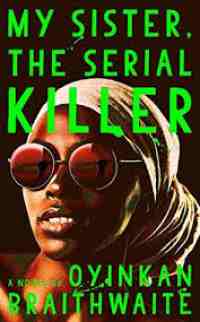My Sister, the Serial Killer by Oyinkan Braithwaite
 Wednesday, March 6, 2019 at 6:04AM
Wednesday, March 6, 2019 at 6:04AM 
Published by Doubleday on November 20, 2018
Ayoola and her sister Korede begin My Sister, the Serial Killer by disposing of a body . . . again. Ayoola stabbed her boyfriend in the heart. His name was Femi. Ayoola can’t remember his last name.
Ayoola has killed two other men. She contends that she killed them in self-defense. When she feels Korede is reproaching her for being a serial killer, she accuses Korede of victim-shaming. Still, Ayoola isn’t all bad; she would take the most recent stabbing back if she could.
Korede works in a hospital. When Dr. Tade asks Korede if he can have her sister’s number, Korede tells him that Ayoola’s relationships tend to end badly. Korede has a thing of her own for Dr. Tade, but she lacks Ayoola’s beauty and effortless ability to ensnare men. Dr. Tade believes Korede should stop undermining Ayoola. Little does he know.
The reader, of course wonders whether Dr. Tade, who seems like a nice enough fellow, will be the next to die. Or perhaps it will be Gboyega, a married man who is financing Ayoola’s fashion business.
The reader also wonders if Korede will make trouble for herself by chatting with a comatose patient named Muhtar. She confides her sister’s murderous actions, then frets when Muhtar awakens. Will he recall her confessions and, if so, what will he do about them?
Korede’s low self-esteem, her complicated relationships with Ayoola and her father, and her longing for Dr. Tade all coalesce to make Korede a sympathetic character. She is a voice of reason compared to most of the other characters, who seem to live in a world of frivolity and needless drama, a world that fails to value the truly valuable. At the same time, Korede is an enabler and has an obsessive moment in which her own behavior is less than exemplary. The novel thus reflects the reality that even good people have their bad moments.
Told in deadpan prose, most of the story is light and amusing despite the rising body count. Oyinkan Braithwaite invites chuckles with her observant wit and clever dialog. For example: “‘Hey! I hate stingy men!’ Chichi repeatedly snaps her fingers over her head, warding off any stingy man who might be tempted to come near her.” And: “She has used juju to useless my husband!”
At the same time, the story is serious when it focuses on Korede’s abusive father, who beats his daughters and offers Ayoola’s virginity to induce a business deal. Perhaps it is with good reason that Ayoola is quick to kill men. The patriarchal nature of Nigerian society and its tendency to treat women as property is one of the two serious themes of My Sister, the Serial Killer.
At the end, as is often the case with people who do not live up to their own expectations, Korede has to make a decision about what kind of person she really is. Whether or not the reader approves of that choice, the novel makes clear that she is the only person who has the right to determine her future. Nobody can decide who someone else should be. That’s the novel’s second serious theme, and it serves to balance a story that is in other respects goofy and fun.
By the way, I thought it was interesting that in Nigeria, the word MAGA means fool. Sounds about right.
RECOMMENDED